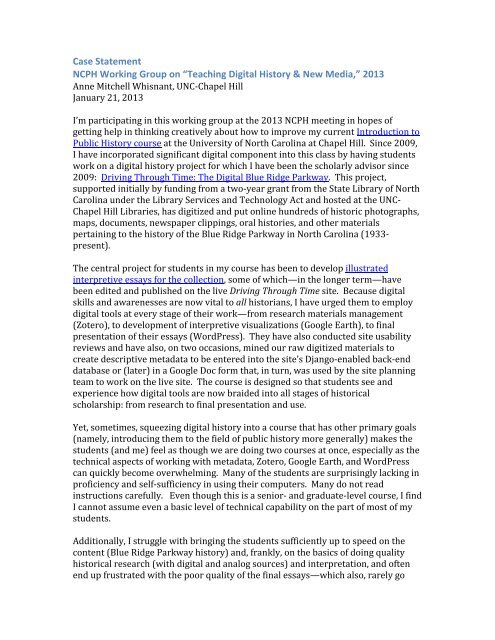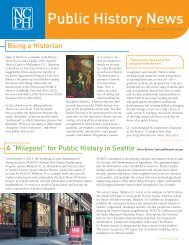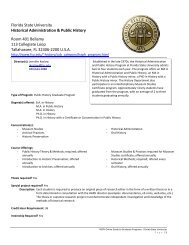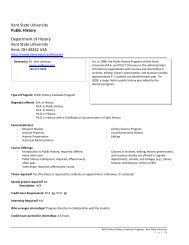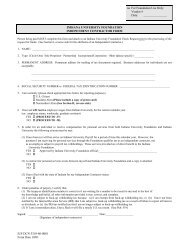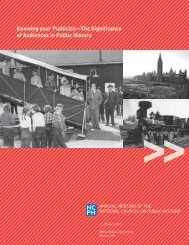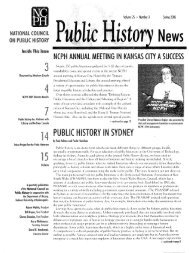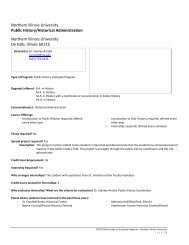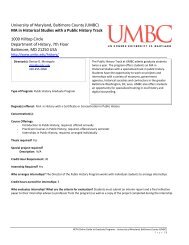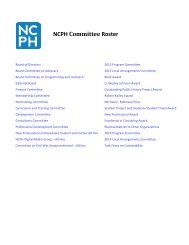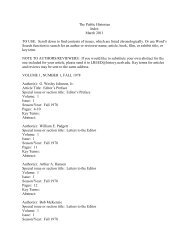Case Statement - National Council on Public History
Case Statement - National Council on Public History
Case Statement - National Council on Public History
You also want an ePaper? Increase the reach of your titles
YUMPU automatically turns print PDFs into web optimized ePapers that Google loves.
<str<strong>on</strong>g>Case</str<strong>on</strong>g> <str<strong>on</strong>g>Statement</str<strong>on</strong>g><br />
NCPH Working Group <strong>on</strong> “Teaching Digital <strong>History</strong> & New Media,” 2013<br />
Anne Mitchell Whisnant, UNC-Chapel Hill<br />
January 21, 2013<br />
I’m participating in this working group at the 2013 NCPH meeting in hopes of<br />
getting help in thinking creatively about how to improve my current Introducti<strong>on</strong> to<br />
<strong>Public</strong> <strong>History</strong> course at the University of North Carolina at Chapel Hill. Since 2009,<br />
I have incorporated significant digital comp<strong>on</strong>ent into this class by having students<br />
work <strong>on</strong> a digital history project for which I have been the scholarly advisor since<br />
2009: Driving Through Time: The Digital Blue Ridge Parkway. This project,<br />
supported initially by funding from a two-year grant from the State Library of North<br />
Carolina under the Library Services and Technology Act and hosted at the UNC-<br />
Chapel Hill Libraries, has digitized and put <strong>on</strong>line hundreds of historic photographs,<br />
maps, documents, newspaper clippings, oral histories, and other materials<br />
pertaining to the history of the Blue Ridge Parkway in North Carolina (1933-<br />
present).<br />
The central project for students in my course has been to develop illustrated<br />
interpretive essays for the collecti<strong>on</strong>, some of which—in the l<strong>on</strong>ger term—have<br />
been edited and published <strong>on</strong> the live Driving Through Time site. Because digital<br />
skills and awarenesses are now vital to all historians, I have urged them to employ<br />
digital tools at every stage of their work—from research materials management<br />
(Zotero), to development of interpretive visualizati<strong>on</strong>s (Google Earth), to final<br />
presentati<strong>on</strong> of their essays (WordPress). They have also c<strong>on</strong>ducted site usability<br />
reviews and have also, <strong>on</strong> two occasi<strong>on</strong>s, mined our raw digitized materials to<br />
create descriptive metadata to be entered into the site’s Django-enabled back-end<br />
database or (later) in a Google Doc form that, in turn, was used by the site planning<br />
team to work <strong>on</strong> the live site. The course is designed so that students see and<br />
experience how digital tools are now braided into all stages of historical<br />
scholarship: from research to final presentati<strong>on</strong> and use.<br />
Yet, sometimes, squeezing digital history into a course that has other primary goals<br />
(namely, introducing them to the field of public history more generally) makes the<br />
students (and me) feel as though we are doing two courses at <strong>on</strong>ce, especially as the<br />
technical aspects of working with metadata, Zotero, Google Earth, and WordPress<br />
can quickly become overwhelming. Many of the students are surprisingly lacking in<br />
proficiency and self-sufficiency in using their computers. Many do not read<br />
instructi<strong>on</strong>s carefully. Even though this is a senior- and graduate-level course, I find<br />
I cannot assume even a basic level of technical capability <strong>on</strong> the part of most of my<br />
students.<br />
Additi<strong>on</strong>ally, I struggle with bringing the students sufficiently up to speed <strong>on</strong> the<br />
c<strong>on</strong>tent (Blue Ridge Parkway history) and, frankly, <strong>on</strong> the basics of doing quality<br />
historical research (with digital and analog sources) and interpretati<strong>on</strong>, and often<br />
end up frustrated with the poor quality of the final essays—which also, rarely go


